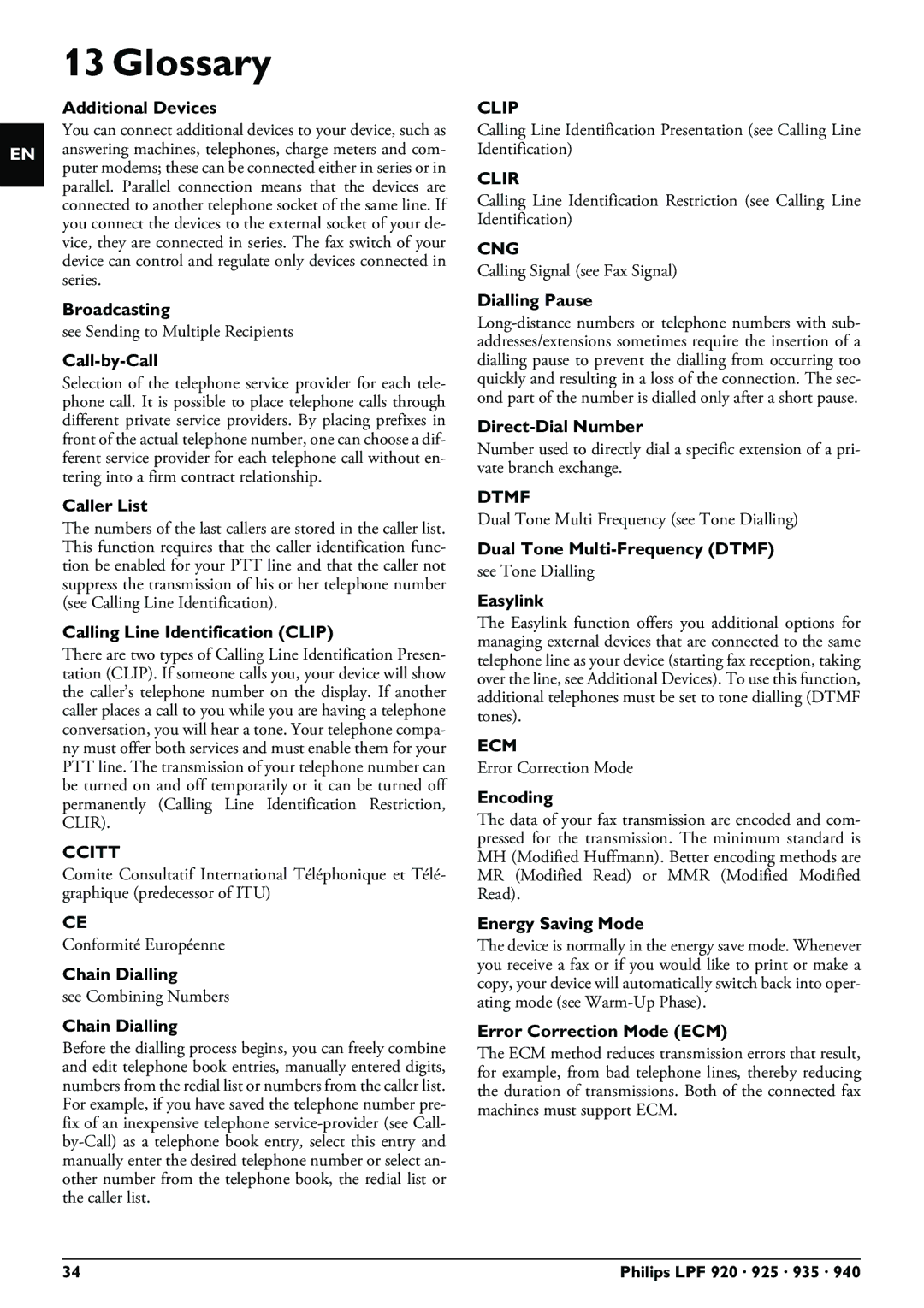
EN
13 Glossary
Additional Devices
You can connect additional devices to your device, such as answering machines, telephones, charge meters and com- puter modems; these can be connected either in series or in parallel. Parallel connection means that the devices are connected to another telephone socket of the same line. If you connect the devices to the external socket of your de- vice, they are connected in series. The fax switch of your device can control and regulate only devices connected in series.
Broadcasting
see Sending to Multiple Recipients
Call-by-Call
Selection of the telephone service provider for each tele- phone call. It is possible to place telephone calls through different private service providers. By placing prefixes in front of the actual telephone number, one can choose a dif- ferent service provider for each telephone call without en- tering into a firm contract relationship.
Caller List
The numbers of the last callers are stored in the caller list. This function requires that the caller identification func- tion be enabled for your PTT line and that the caller not suppress the transmission of his or her telephone number (see Calling Line Identification).
Calling Line Identification (CLIP)
There are two types of Calling Line Identification Presen- tation (CLIP). If someone calls you, your device will show the caller’s telephone number on the display. If another caller places a call to you while you are having a telephone conversation, you will hear a tone. Your telephone compa- ny must offer both services and must enable them for your PTT line. The transmission of your telephone number can be turned on and off temporarily or it can be turned off permanently (Calling Line Identification Restriction, CLIR).
CCITT
Comite Consultatif International Téléphonique et Télé- graphique (predecessor of ITU)
CE
Conformité Européenne
Chain Dialling
see Combining Numbers
Chain Dialling
Before the dialling process begins, you can freely combine and edit telephone book entries, manually entered digits, numbers from the redial list or numbers from the caller list. For example, if you have saved the telephone number pre- fix of an inexpensive telephone
CLIP
Calling Line Identification Presentation (see Calling Line Identification)
CLIR
Calling Line Identification Restriction (see Calling Line Identification)
CNG
Calling Signal (see Fax Signal)
Dialling Pause
Number used to directly dial a specific extension of a pri- vate branch exchange.
DTMF
Dual Tone Multi Frequency (see Tone Dialling)
Dual Tone
see Tone Dialling
Easylink
The Easylink function offers you additional options for managing external devices that are connected to the same telephone line as your device (starting fax reception, taking over the line, see Additional Devices). To use this function, additional telephones must be set to tone dialling (DTMF tones).
ECM
Error Correction Mode
Encoding
The data of your fax transmission are encoded and com- pressed for the transmission. The minimum standard is MH (Modified Huffmann). Better encoding methods are MR (Modified Read) or MMR (Modified Modified Read).
Energy Saving Mode
The device is normally in the energy save mode. Whenever you receive a fax or if you would like to print or make a copy, your device will automatically switch back into oper- ating mode (see
Error Correction Mode (ECM)
The ECM method reduces transmission errors that result, for example, from bad telephone lines, thereby reducing the duration of transmissions. Both of the connected fax machines must support ECM.
34 | Philips LPF 920 · 925 · 935 · 940 |
